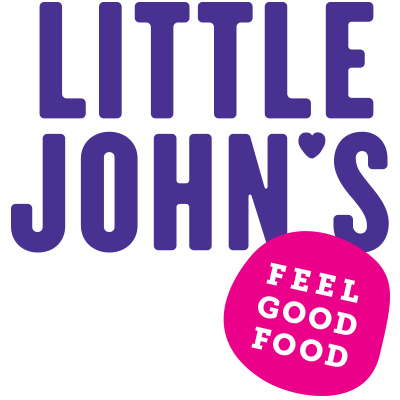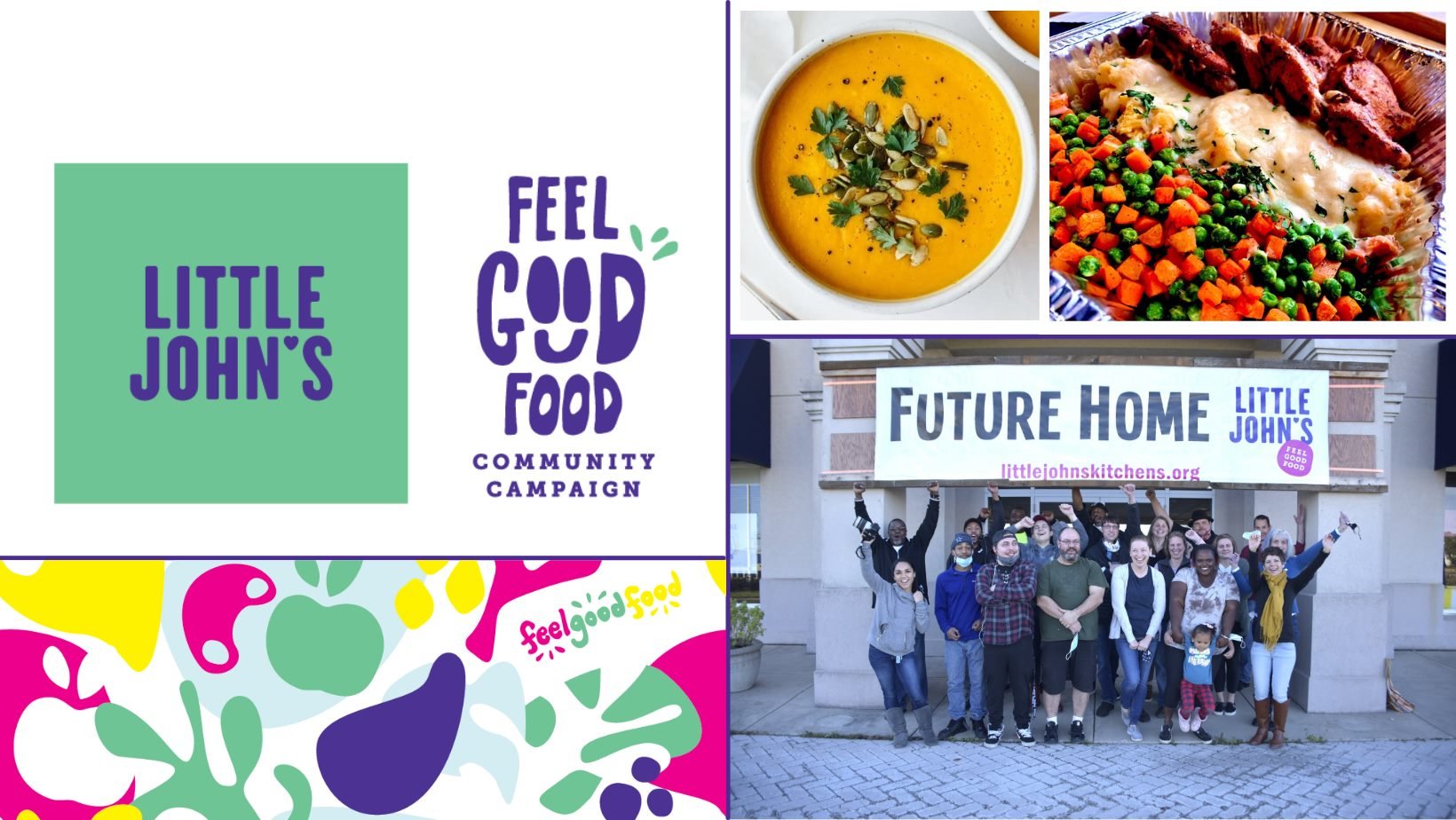Nonprofit Spotlight: Little John’s addresses food excess and access
Posted by Samantha Haas on Monday, March 28th, 2022 at 3:27pm.
Think about your last trip to buy groceries. If you’re like me, you drove your vehicle for a few minutes to your choice of grocery stores. Perhaps you picked up each piece of produce to inspect if it had any imperfections, and then gently set it aside to opt for one that looked better – ignorant to just how prevalent food waste is in our country. You filled up your cart with more items and your trunk with several bags and got home in time to cook a balanced meal.
 Now imagine how that experience might be different if you needed to walk, ride a bike, or take a bus to get groceries instead – especially if it’s raining, snowing, dark out, or you have kids along with you. How many bags can you manage? How much time do you have to make a meal once you get home? If a gas station is your closest option, what nutritious food items are you able to find there?
Now imagine how that experience might be different if you needed to walk, ride a bike, or take a bus to get groceries instead – especially if it’s raining, snowing, dark out, or you have kids along with you. How many bags can you manage? How much time do you have to make a meal once you get home? If a gas station is your closest option, what nutritious food items are you able to find there?
These questions are a daily reality for many people, particularly those who live in food deserts. And despite the many grocery stores, restaurants, and food pantries throughout the Madison area, there are still people in our community who don’t have easy access to fresh, affordable food options. It’s a troubling gap that a new nonprofit is focused on filling.

Knowing that “40% of all food produced in America is thrown away before it ever reaches a consumer” and that “49 million Americans live in food insecure homes,” Little John’s mission is to be the “community's kitchen for transforming food excess into accessible, chef-quality meals for EVERYONE regardless of their means.” The brainchild of Dave Heide, who is also the owner and executive chef of Liliana’s Restaurant in Fitchburg, Little John’s hopes to “eliminate shame around food access” and bring “feel good food” to all through its pay-what-you-can concept.
 Chef Heide recently presented about the Little John’s model during DreamBank’s Impact for Good webinar series. In that conversation he shared that, so far, 400 tons of food have been rescued from three grocery stores, with only about 2 percent that ends up being composted. Once the new building and equipment are up and running, Little John’s will be unlike other nonprofits in that it will be 100 percent cash sustainable. Heide is foregoing a paycheck for this passion project, though he is committed to starting employees off with $20 per hour minimum wage and full benefits.
Chef Heide recently presented about the Little John’s model during DreamBank’s Impact for Good webinar series. In that conversation he shared that, so far, 400 tons of food have been rescued from three grocery stores, with only about 2 percent that ends up being composted. Once the new building and equipment are up and running, Little John’s will be unlike other nonprofits in that it will be 100 percent cash sustainable. Heide is foregoing a paycheck for this passion project, though he is committed to starting employees off with $20 per hour minimum wage and full benefits.
Rather than being a wealth-generating business, the Little John’s team opted for a community-first approach. That includes choosing to break even rather than making a profit from a majority of its catering contracts like schools, having an on-site social worker in part for its military veterans internship program, offering a community space at its new building, and creating a destigmatizing dining environment for all people.
“We all have the capacity to make a difference,” Heide said, adding that a micro impact can turn into macro actions that result in positive change. “Unite with another dreamer, work with your community, be passionate about your project, and surround yourself with people who love and support you and believe in your vision.”
 We caught up with business development coordinator Maegan Cassel to learn how Little John’s is making a positive impact on the community – even before its brick and mortar presence on Verona Road is fully operational. The following interview has been edited for length and clarity.
We caught up with business development coordinator Maegan Cassel to learn how Little John’s is making a positive impact on the community – even before its brick and mortar presence on Verona Road is fully operational. The following interview has been edited for length and clarity.
Q&A with Maegan Cassel
What makes Little John’s Kitchens & Restaurants unique?
“There are other pay-what-you-can restaurants in the country and even in Milwaukee, but what’s different about Little John’s is that we’re also rescuing the food and turning it into healthy meals. The restaurant was our first goal, but then we saw how much waste and how little sustainability there is within the food system. By rescuing food, we can reduce costs and make the donated meals and pay-what-you-can model more successful and better fit the needs of the community. We’ve been changing organically based on where we see there are gaps. We will also offer a 6-month paid job skill training internship primarily for military veterans, and we wanted to make sure they feel supported in everything they were doing, so we’re going to have a social worker on-site and quiet spaces to relax and chill out.” (Check out this Fitchburg Star article “Big dreams, bigger appetites” to learn more.)
Where does the food come from?
“When we first started, our food was only coming from Metcalfe’s Markets. Now we are growing a partnership with Hy-Vee as well, since a lot of food is still perfectly good to use but may have a bump or bruise or is close to its sell-by date. We also help a lot of local farms with their gleaning process so that what they don’t have time to pick isn’t just left in a field. Not all food banks have the storage necessary for those items and it’s easier to keep nonperishable canned items on their shelves. We’re the last step for any of the grocers since we’re able to take proteins and produce, too.”
Where and how are the meals made?
“Little John’s is temporarily operating out of the Verona Athletic Center and has an offsite warehouse. We are very much at capacity by making 10,000 meals per week. Our goal is to make 240,000 meals per week, which we’ll be able to do when we raise enough money to purchase new equipment and to revamp the building at 5302 Verona Road, Fitchburg (the former A1 Furniture & Mattress store). For example, the steam-jacketed kettles we need are about $300,000 per machine. We could mix, cook, and season 240 gallons of ground beef at once with only one or two cooks, so labor costs won’t go up too much. Labor is intense now because we’re making multiple small batches. Right now we’re trying to keep it to two basic menus: a youth menu for schools and childcare facilities and an adult menu for events and Meals on Wheels programs. Both menus offer options to meet dietary or allergy needs.”

What is the significance of your new location?
“Our new building on Verona Road is located in a food desert. The voting district doesn’t have one restaurant, and a gas station is the closest place for food. On the bus line it could take someone an hour to get to a grocery store or restaurant, and with kids that can be tough. Last year we also used the building as a polling place, and voting turnout increased by 19% compared to the Dane County average of only up 8% – likely because of the centralized location. That community space will evolve when the new building is completed. Different needs have come to light and we wanted to include everyone, so there will also be gender neutral bathrooms and a shower for those who are homeless and need a safe space as well as an area for other nonprofits to hold events.”
Since the restaurant isn’t open yet, where are your meals being served?
“When the pandemic first hit and school buildings closed, there was a gap of students not knowing where their next meal was coming from. We started a family meal program through Reach Dane and the Boys and Girls Club of Dane County to donate meals that each feed six people. Then we quickly realized there’s a need for nutritious meals with senior citizens as well, so we have an evening and weekend Meals on Wheels program available throughout Madison, Fitchburg, Verona, Middleton, Monona, and Sun Prairie with hopes of expanding to more of Dane County. We also distribute meals through Oregon and Fitchburg Senior Centers. We do some other programs with Feeding the Youth and Urban Triage, including delivery to the homeless encampments and other vulnerable populations in the area. We also distribute meals to local churches and food pantries, and we have catering requests from more groups. Our goal is to get into more schools and better the programs in the community.” (Check out this CapTimes article “Fitchburg food insecurity nonprofit Little John’s pivots to catering” to learn more.)
Where do you fit in the network of existing food-related groups and services?
“We noticed that all the nonprofits in the food world have the same mission – we want everyone in our community to have access to food. We’re not going to be a replacement for any of the food pantries that offer groceries, deliveries, and in some cases meals. We’re going to be a convenient stop to receive a premade meal made with love. We’re happy to collaborate with any of these groups because we want to help everyone.” (Check out this Isthmus article “Waste Not” to learn more.)
How can people help?
“We’re always looking for volunteers. Approximately 100 volunteers keep us running on a weekly basis. Many of our needs are delivering meals, packaging meals, and making breakfast kits. If anyone has special talents, including writing, social media, and marketing, we’d love to hear from you, too. We are about halfway to our $6 million fundraising goal, which we hope to meet by the time we break ground in June, so donations are appreciated. Finally, reflect on where there are gaps around you and what you could be doing to be a better neighbor in your community.”
